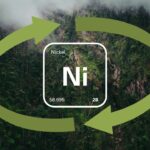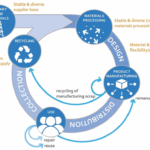Northvolt’s new sodium-ion battery offers a European alternative to lithium batteries
by Nicole Amy Horner and Alessandra Hool (ESM Foundation)
With its new sodium-ion battery, Northvolt, a Swedish battery developer and manufacturer, is taking a step towards a future of lithium-free batteries. The new battery has an energy density of more than 160 Wh/kg, and first sample cells will be available for selected customers starting in 2024. According to Northvolt, the battery has been designed for electricity storage plants but could also be used in electric vehicles, like two-wheeled scooters, in the future.
Due to the massively increasing demand for energy storage in the clean transition, lithium is rapidly growing in global importance, as it is used in the vast majority of commercially available batteries today. According to the International Energy Agency (IEA), the demand for lithium is expected to increase by 13 times by 2040 in a “business as usual” scenario. If all countries were to aim to reduce global warming to 2° Celsius, the demand for lithium would increase by 42 times during the same timeframe. By developing alternatives like Northvolt’s sodium-ion battery, EU countries hope to lessen their dependency on the currently dominating countries in lithium production. Today, most lithium is extracted in Australia, Chile, and China, with China also playing a significant role in processing lithium and battery manufacturing.
Start-up recycling companies are popping up all over Europe and North America, and battery-recycling facilities are already common in China. Recycling will be an essential source of battery raw materials in the future, fuelled by economic, environmental, strategic, and regulatory drivers – such as the 2023 New Battery Regulation in the EU. Today, however, the amount of end-of-life batteries available for recycling is far from being sufficient to meet the rapidly growing demand.
In the meantime, companies will continue researching alternatives to lithium-based batteries, including aluminium- and magnesium-ion, solid-state and flow batteries. Breakthroughs that would lead to a widespread application of such alternative battery technologies for electric vehicles could change the expected demand and, therefore, the criticality of lithium in the future. A remaining downside of sodium-based batteries, compared to those working with lithium, is their higher weight, which is a disadvantage for mobile applications. Still, sodium-ion technology is currently the most promising alternative to lithium-based battery solutions due to the fact that sodium is an abundant and low-cost material with a comparably low environmental footprint, and layered-oxide cathodes that use sodium don’t require cobalt or nickel, as lithium batteries and other battery types often do. Furthermore, sodium-ion batteries promise to be safer than Li-ion batteries, and existing infrastructure might be used for their production.
CATL, the world’s largest electric vehicle battery manufacturer, announced in 2021 that it will release a sodium battery for electric vehicles in 2023. The first commercially available cars with these batteries are expected to be launched by the Chinese company Chery Automobile shortly.
References
- Elektrische Energiespeicher und Versorgungssicherheit. Forum Energiespeicher Schweiz. November 2023. https://speicher.aeesuisse.ch/wp-content/uploads/sites/15/2023/11/FESS_Kompendium_2_2023.pdf
- Northvolt develops state-of-the-art sodium-ion battery validated at 160 Wh/kg. Northvolt. November 21. https://northvolt.com/articles/northvolt-sodium-ion/
- Electric Cars Are Taking Off, but When Will Battery Recycling Follow? The New York Times. December 21, 2022. https://www.nytimes.com/2022/12/21/business/energy-environment/battery-recycling-electric-vehicles.html
- Regulation (EU) 2023/1542 of the European Parliament and of the Council of 12 July 2023 concerning batteries and waste batteries, amending Directive 2008/98/EC and Regulation (EU) 2019/1020 and repealing Directive 2006/66/EC (Text with EEA relevance). European Parliament, Council of the European Union. July 28, 2023. https://eur-lex.europa.eu/eli/reg/2023/1542/oj
- First electric cars with BYD and CATL sodium-ion batteries without lithium to launch by year’s end. NOTEBOOKCHECK. April 21, 2023. https://www.notebookcheck.net/First-electric-cars-with-BYD-and-CATL-sodium-ion-batteries-without-lithium-to-launch-by-year-s-end.709264.0.html
- China’s Chery to Use CATL’s New Sodium Batteries in Its Cars. Yicai Global. April 17, 2023. https://www.yicaiglobal.com/news/china-chery-to-use-catl-new-sodium-batteries-in-its-cars
- Firms are exploring sodium batteries as an alternative to lithium. The Economist. October 25, 2023. https://www.economist.com/science-and-technology/2023/10/25/firms-are-exploring-sodium-batteries-as-an-alternative-to-lithium




